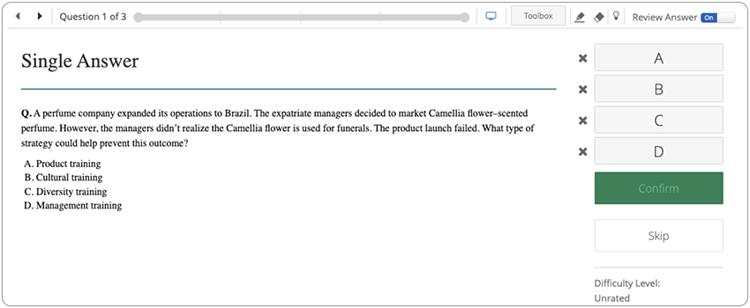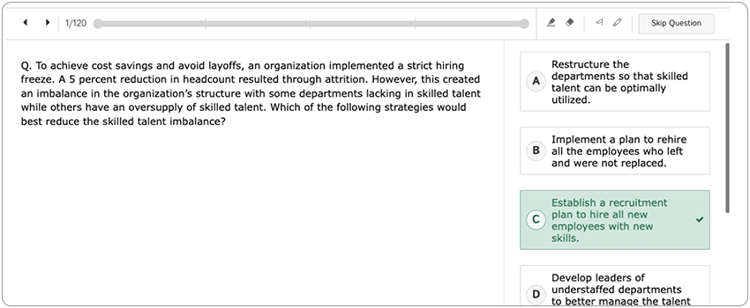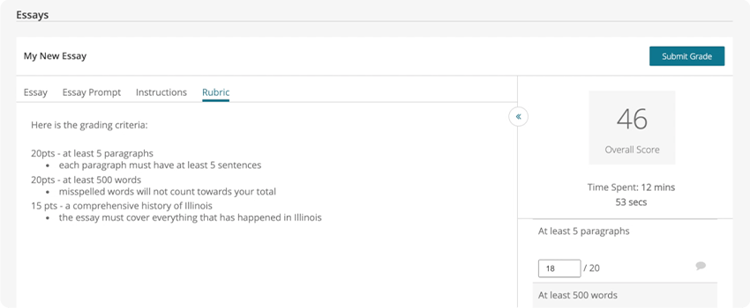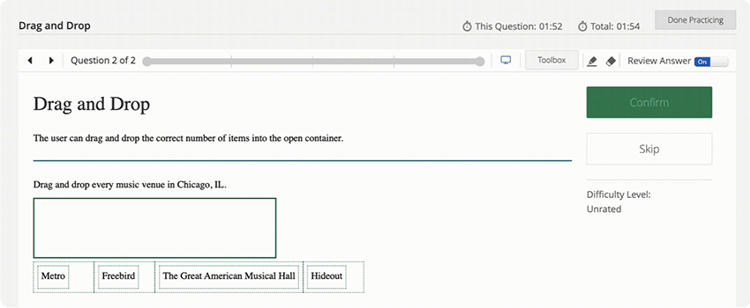Unpacking Different Question Types on BenchPrep’s Learning Platform
When learners are studying for important entrance, licensing, and credentialing exams, experience matters. A one-size-fits-all approach simply does not work. Learners need variety to help them retain complex information, so if you want to help them get ready for the test as effectively and efficiently as possible, you must keep your courses and practice tests fresh and engaging.
Luckily, the BenchPrep platform is equipped with a plethora of question types for course creators and content managers to implement. Plus, with access to insights on question data and learner engagement analytics, content managers can hone in on what’s working and where learners are struggling via BenchPrep’s best-in-class Data Suite.
This post will highlight the various question types available on the BenchPrep platform, the benefits and possible use cases for each, and the value to your learners. Plus, each question type listed below can be configured to be scored or unscored – offering the ultimate flexibility for your program administrators, content managers, and instructional designers.
Back to Basics: Classic Exam Questions
When studying for an exam or certification, it’s important to ensure your practice questions and course content are aligned to what will be on the actual test to best prepare your learners. As such, BenchPrep’s learning platform is equipped with all your tried and true question-taking types.
Multiple Choice Questions
Multiple choice questions have existed for over 100 years with origins dating back to the United States Army leveraging this approach to prepare American citizens for World War I. Multiple choice questions are simply questions that have multiple answer selections. However, rather than just your standard multiple choice question and answer, BenchPrep has a few configurations within our multiple choice questions. Content managers and administrators are able to denote whether multiple choice answers should have a single answer, multiple answers, or one answer with multiple valid options. Additionally, true and false questions can also easily be configured.

This variation enables course creators to have more flexibility when determining the best approach for their learners and content. Typically, multiple choice questions are best suited for knowledge-based information that doesn’t require a ton of interpretation, however, with varying options for multiple choice configurations, administrators can ensure that learners are able to retain all relevant information and content on specific subject matter.
When developing and implementing multiple choice questions in your learning program, try to focus on subject matter expertise versus questions that simply test a learner’s memory. For example, if developing a course on the fundamentals of digital marketing, don’t just simply quiz your learners with a question like, ‘What is SEO?’. Rather, ask them to select the benefits of SEO from a handful of selections. This approach will ensure your learners are not just memorizing facts, but instead grasping the full understanding of your subject matter.
🔎 Learn how ACT leveraged BenchPrep’s features to customize their test prep program and deliver a digital learning ecosystem, “ACT: Taking Digital Learning to the Next Level”
Passage-Based Questions
The BenchPrep platform offers a few different types of passage-based questions that typically involve reading a short passage and answering questions based on the material. The platform allows modifications to passages and offers content managers the ability to highlight specific passages within a passage so learners know exactly where the question material will stem from.
Passage-based questions help learners master reading comprehension, interpretation, and critical thinking skills – many skills that end up being a large factor on high-stakes exams.
Side-by-Side Question Experience
Within single-answer multiple choice and multiple-answer multiple choice question types, we have an option to leverage our side-by-side question display. This question experience is best suited for passage-based questions or questions with large graphics.

Side-by-side questions gives content managers and administrators the option to customize the answer rationale for every possible answer, which helps learners to understand the why behind each possible answer.
Numeric, Free Entry, Range, and Free Response Questions
Oftentimes when preparing for an exam or working through specific course material, there will be subject matter that requires learners to input specific information in the form of free-response questions.
Numeric Entry and Range Questions
Numeric entry answers are a great option reserved for equations and other math-based questions. In this question type, learners must enter a numeric value. Both single and multiple values can be provided as correct from content managers. For example, content managers can choose to accept both the answer ‘4’ as well as ‘4.0’ to ensure decimal values are properly accounted for.
Additionally, BenchPrep has a range question type that is essentially an extension of the numeric entry question type, where correct values fall within a specified range.
Text Entry Questions
Similar to numeric entry, text entry questions instruct students to type correct answers, usually in the form of a single word or short phases. The answer validates the students’ response, awarding them a ‘correct’ or ‘incorrect’ answer based on their entry.
This question type is often reserved for subject matter that requires learners to retain specific facts or information on a topic. For example, you may consider sprinkling text entry questions instead of multiple choice to ensure learners are retaining factual information versus selecting from a subset of answers.
Free Response Questions
Free response questions are very similar to text entry aside from the fact that there is no true or false validation component to free response questions, making this question type a great option for longer responses, reflective statements, feedback, and for summative purposes.
For example, a question may ask a student to explain the advantages and disadvantages of leveraging a specific SEO strategy. Learners will receive credit for completing the question, and content managers and administrators can review answers.
Essay Questions
Sometimes, standard question types aren’t enough. BenchPrep’s Essay Tool goes beyond your standard five-paragraph essay by providing flexibility for your learning program. With the Essay Tool, learners have the opportunity to write and self-grade essay responses directly in the platform, or admins can configure essays to be graded directly by an essay grader role.

Maybe, your learners are studying for a continuing education exam with essay questions. Or, maybe you want to see unique answers. Or, maybe you want a starting point for discussions in a blended learning program. You could create essay prompts to allow learners to explore a topic in more depth. Or, you could see how individual learners solved a problem with more than one right answer.
🔎 Learn more about BenchPrep’s Essay Tool in our blog post, ‘New Product Feature: Open-ended Questions for Effective Assessment’
Keeping Learners Engaged with Interactive Question Types
Aside from the standard test-taking question types above, the BenchPrep platform also has additional question features for an interactive test-taking experience.
Drag & Drop Questions
These questions instruct learners to correctly order a list of options. For example, maybe you want to ask learners to correctly order the steps that are needed to develop a marketing email campaign. Instructors and content managers can list all possible options, and the learner can drag and drop answers in the right order.

Drag and drop questions can also be configured to be unordered. For example, a question might ask all the required steps needed to develop a marketing email campaign, and the learner is instructed to drag and drop all the required steps without taking the order into account.
Hotspot Questions
The Hotspot question types allows instructors and content managers to designate a certain area on an image or graph as being ‘correct,’ and based on a learner’s click, awards them a ‘correct’ or ‘incorrect’ response. For example, you may decide to display a marketing funnel and then ask them to correctly place where advertising would fall.
Table Entry Questions
Table entry questions offer a versatile way of setting up questions that have multiple layers of answers. Within a single question, a learner is able to answer multiple questions using a single set of data.
Question content is formatted similarly to all our other question types, and answers and necessary information will be listed within the question content. Answers content also contains explanations for the multiple answers that can exist within a “Table Entry” question.
As you can tell by this post, BenchPrep’s LMS won’t leave you begging for variety. Our approach ensures that content managers will have plenty of options when designing course content and practice exams, and perhaps more importantly, learners will never be bored.
Plus, all question types are mobile-responsive for on-the-go learning, and you’ll have access to insights and course data to help you hone in on where learners may be struggling so you can make easy adjustments to your content.
Want to see our question types in action and find out how they can help to transform your learning programs?

-1.png)



